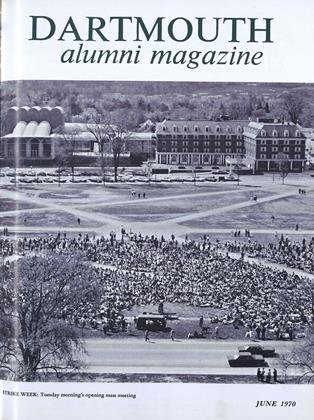IF, in the end, the objectives of the Dartmouth Strike are to be achieved, it will only be through a general consensus among the American citizenry that those objectives are proper. In recognition of this, one of the major activities of the Dartmouth Strike was a massive canvassing effort.
Though the canvassers went out armed with a petition which they would eventually present to the Congressional delegations of New Hampshire and Vermont and for which they managed to secure a very large number of signatures, the major emphasis of the canvass was reasoned discussion on the war and the domestic situation.
Despite the much discussed generation gap, the student canvassers found it relatively easy to talk to the people of the two states and in so doing probably learned as much as they taught. To many of the students the canvass experience was refreshing proof that they were not alone and isolated in their feelings on the war. It seemed clear that the events which had led to the 'Dartmouth Strike had also produced a strong reaction in people outside of the university system.
At the end of a week's canvassing, a delegation from all the New Hampshire and Vermont schools involved in the effort went to Washington and presented the first 10,000 signatures to the Congressional delegations of those two states. It did not magically change hawks into doves, but there can be no doubt that each number of the delegations was made to realize that a large, middle-of-the-road opposition to the war exists in their districts. Senator McIntyre agreed to return home for a "Town Meeting on Southeast Asia."
As Mike Ross '71 summed up the Washington trip: "I was very happy and pleased. We didn't change the picture overnight, but none of us expected to. What we can say, though, is that we succeeded so far as could have been reasonably expected." This serves equally well to sum up the entire canvassing effort.
Before setting out to canvass, PeterFogg '70 shortens his locks with thehelp of Barber Steve Shirey '72.
 View Full Issue
View Full Issue
More From This Issue
-
 Feature
FeatureFor Want of a Better Word They Called It a Strike
June 1970 By DAVID MASSELLI '70 and WINTHROP ROCKWELL '70 -
 Feature
FeatureSix Professors Reach Retirement
June 1970 -
 Feature
FeatureNew Environmental Studies Program To Be Launched in the Fall
June 1970 By ROBERT B. GRAHAM '40 -
 Feature
FeatureThe Class Officers Weekend
June 1970 -
 Article
ArticlePRESIDENT KEMENY'S RADIO TALK
June 1970 -
 Article
ArticleWhat the Workshops Meant
June 1970 By GUY DE MALLAC-SAUZIER
Article
-
 Article
ArticleRetiring as Plant Superintendent
June 1953 -
 Article
ArticleA Fine Season, But Few Salutes
June 1974 -
 Article
ArticleNUPTIALS
OCTOBER 1996 -
 Article
ArticleTuck School
January 1961 By GKORGE P. DROWNE JR. '33 -
 Article
ArticleMother Lode
NovembeR | decembeR By Lauren Chisholm ’02 -
 Article
ArticleThe College
JUNE 1978 By William H. McCarter '19

